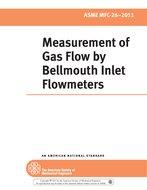Cart 0 Product Products (empty)
No products
To be determined Shipping
$0.00 Total
Product successfully added to your shopping cart
Quantity
Total
There are 0 items in your cart. There is 1 item in your cart.
Total products
Total shipping To be determined
Total
New Reduced price!  View larger
View larger
 View larger
View larger ASME MFC-26-2011 (2018)
M00000675
New product
ASME MFC-26-2011 (2018) Measurement of Gas Flow by Bellmouth Inlet Flowmeters
standard by ASME International, 08/01/2011
In stock
More info
Full Description
This standard applies only to the steady flow of single-phase gasses and gas mixtures and applies only to bellmouth inlet flowmeters in which the flow remains subsonic throughout the measuring section and the flow is steady of varies only slowly with time. It also addresses procedures by which calibration of the device can be made to allow for application with consistent conclusions and with known limits of uncertainty.Bellmouth inlet flowmeters should be used only within the limits for which a given unit is tested, or if additional uncertainty can be tolerated, over a range within which extrapolation is reliable.
This Standard outlines the general geometry and method of use of bellmouth inlet flowmeters to determine the mass or volumetric flow rate of the gas or gas mixture flowing through the device. It also gives necessary information for calculating the flow rate and its associated uncertainty.
A bellmouth inlet flowmeter is a device that provides flow conditioning and flow measurement whose inlet is located or positioned in a large reservoir or supply source. The reservoir can be outside ambient, room or plenum conditions depending on the application. The bellmouth inlet flowmeter is also referred to as an airbell, nozzle with zero beta ratio, borda tube, etc. Typically geometry consists of a convergent inlet followed by a constant throat area. This flowmeter is a differential pressure type device that allows determination of the flow rate from the differential pressure between the total pressure and static pressure at a single specified axial location in the constant area throat of the bellmouth.
Key Features:
Fundamentals and usage
Used extensively in aerospace test facilities for gas turbine engines for flow conditioning and flow measurement. Inlet flare design and measurement considerations are provided.Non-mandatory appendix provided for the development of calculation with derivation.Instrumentation
Options for instrumentation methods are provided and the impact on calculation and calibration are discussed. Also provided are total pressure, static pressure, and total temperature measurements and how they must be consistent in calibration and use.Calibration and uncertainty
Various methods for developing NIST traceable results for calculated air flow rate in velocity, volumetric and mass flowrates are discussed. Overview of boundary layer growth and other contributors to calibration results are considered.Computational fluid dynamics (CFD) analysis is mentioned as significant impact to calibration result.Also provided is an overview of the approach for developing uncertainty statement (data quality) with practical steps for determination.Intended for engineers and other users of gas-flow measurement devices in such industries as energy, automotive and aerospace.

